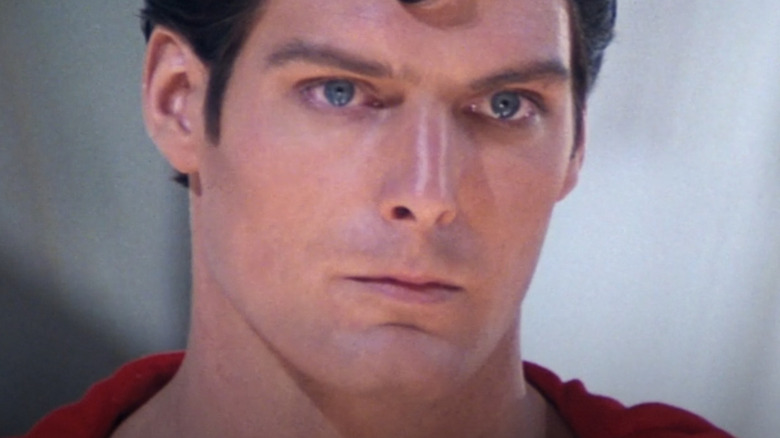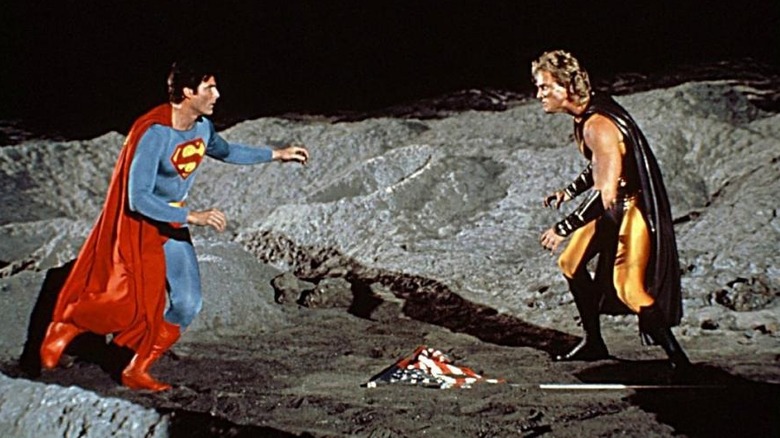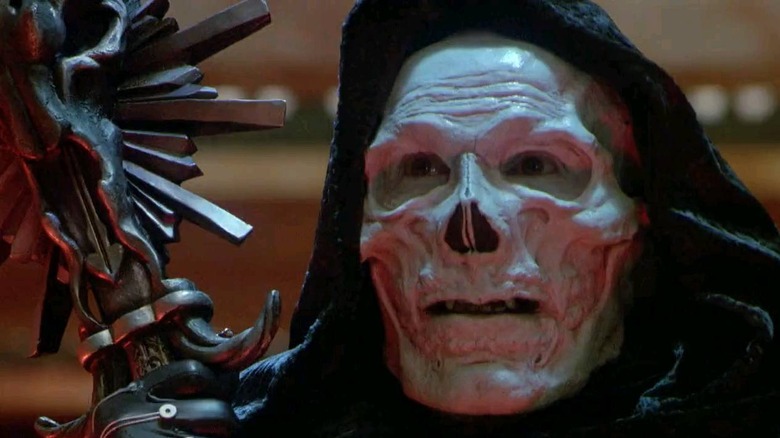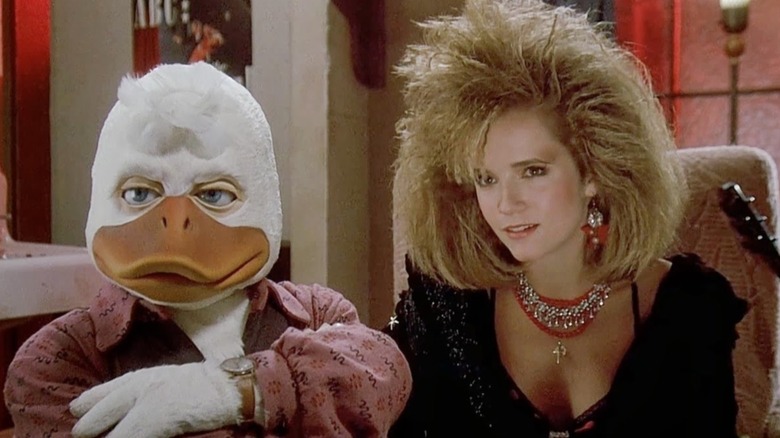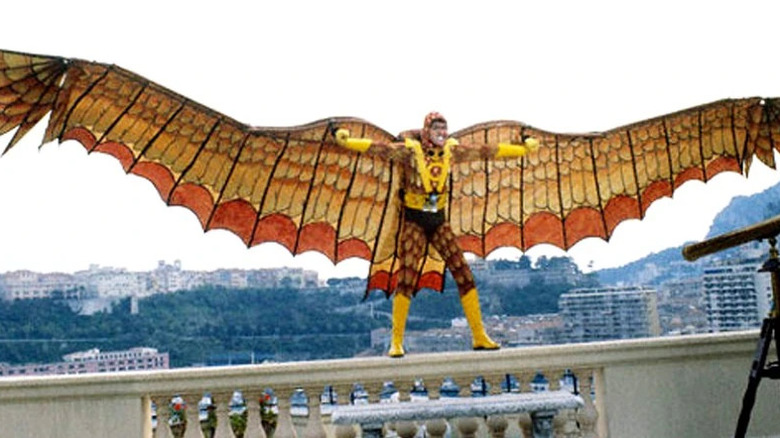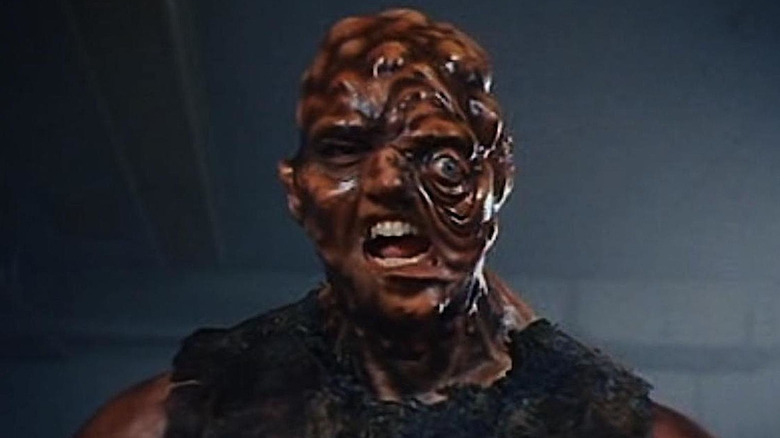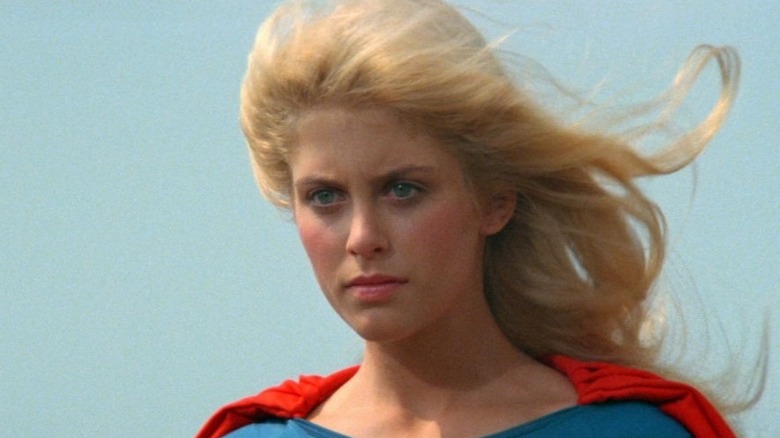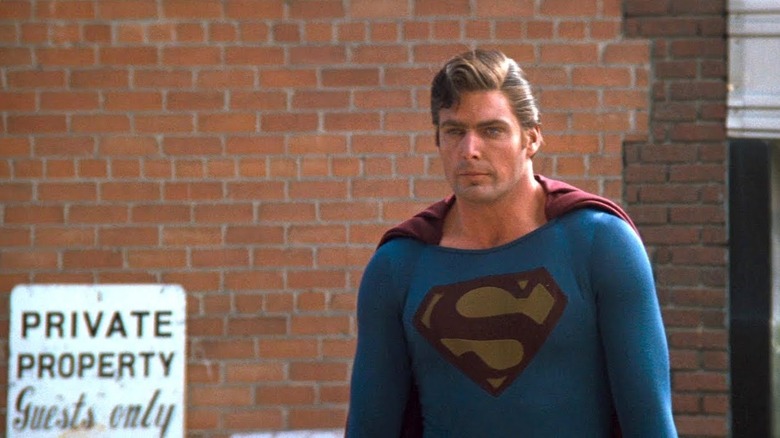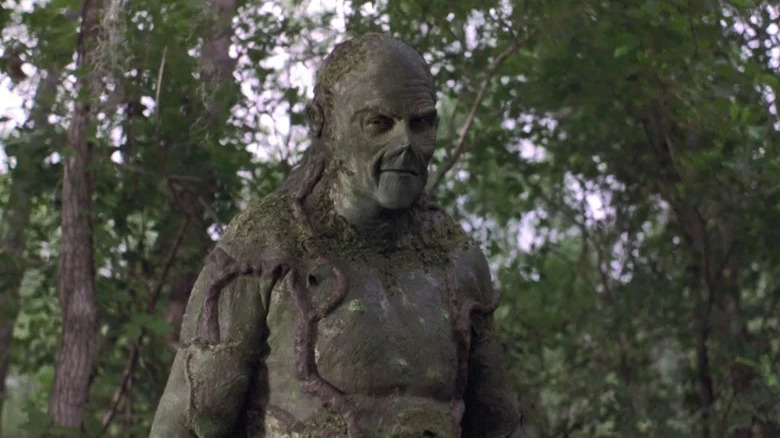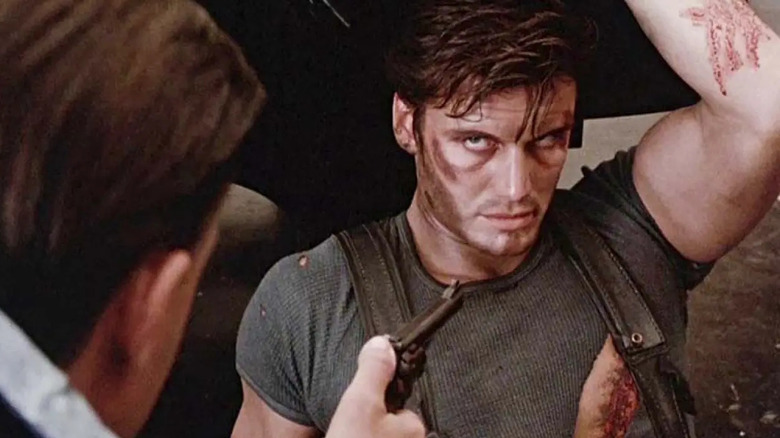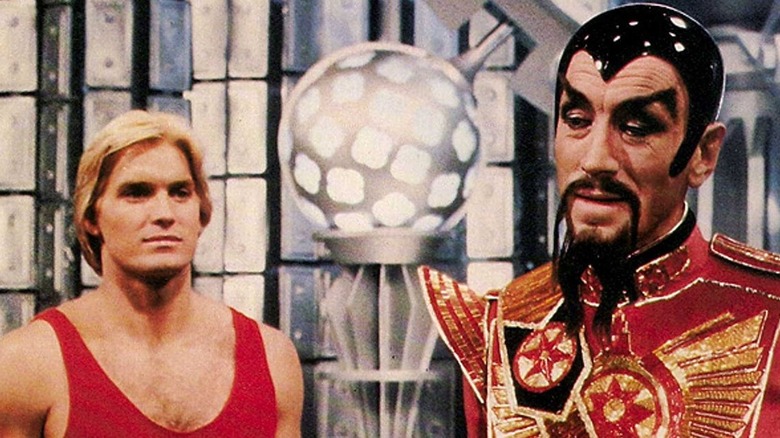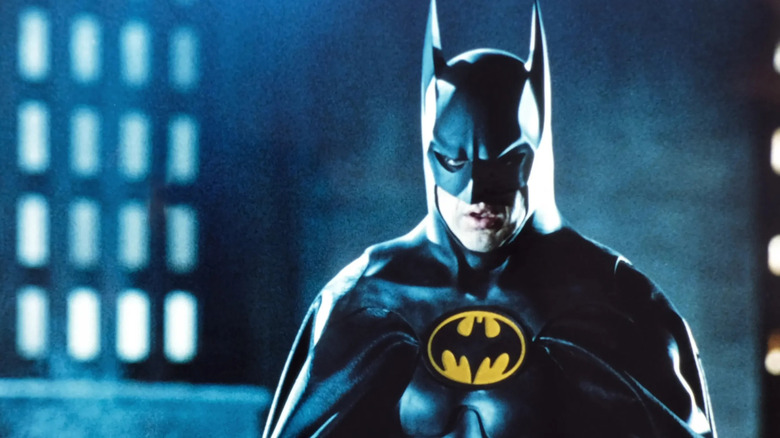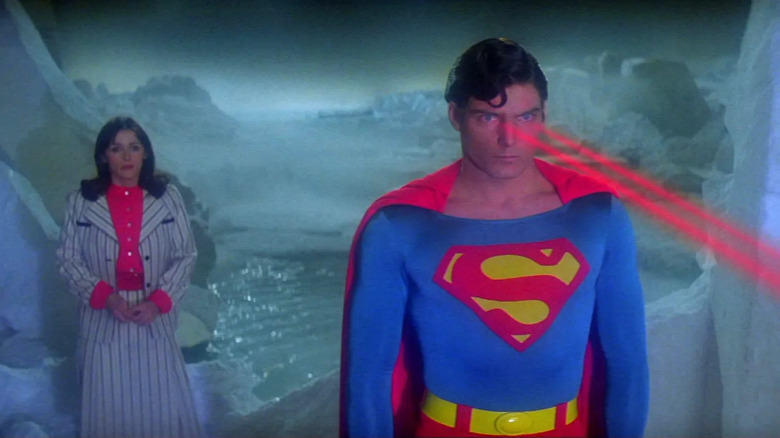The Best Superhero Movies Of The 1980s Ranked
It's hard to imagine a world without superheroes, the genre being so closely tied to pop culture nowadays. Having first been introduced to the world in the 1930s and '40s with a plethora of memorable comic book characters, superheroes have only continued to grow in popularity among global audiences thanks to the number of contemporary superhero films that have been dominating the film industry.
Whether we're talking about the 30 or so MCU movies or the latest DC film, there's no question that superhero movies are firmly ingrained in modern movie audiences' imaginations, having become perhaps the most popular cinematic genre of the past few decades. With that in mind, it's easy to forget that superhero movies themselves have been around for a lot longer than most of the modern iterations we tend to think of today. Decades before the Avengers assembled for the first time onscreen or even before Tobey Maguire's Spider-Man was swinging through the streets of New York City, Christopher Reeve's Superman and Michael Keaton's Batman were protecting their respective cities from certain doom.
The 1980s may not be as revolutionary a decade for the superhero genre as the 2000s were for Marvel or DC, but it's still interesting to note the number of early entries that proved critically and commercially successful among audiences at the time. Here are some of the greatest superhero films of the 1980s, many of which are still considered some of the genre's finest even now, 40 years later.
12. Superman IV: The Quest for Peace
It's no exaggeration to say that 1987's "Superman IV: The Quest for Peace" is not only one of the worst movies of the 1980s, but perhaps one of the worst movies ever made, period. Marred by numerous plot holes and unbelievably bad special effects, it was an incredibly disappointing conclusion to the first "Superman" film series. To distract Superman (Christopher Reeve) from his plans to decrease the number of nuclear weapons in the world, Lex Luthor (Gene Hackman) creates a solar-powered superhuman (Mark Pillow) to battle the Man of Steel.
There isn't a whole lot about "Superman IV" that is enjoyable to watch, the movie being little more than a ridiculously over-the-top, live-action version of the dated "Superman" cartoons and comics (in one scene, Superman literally collects all of the world's nuclear missiles in a giant net and throws them into the Sun). It's a half-baked concept that was poorly executed in every conceivable way, with fans and critics instantly giving the film negative reviews upon its release.
"The earlier films in the series were far from perfect, but at their best they had some flair and agreeable humor, qualities this one sorely lacks," said Variety. The unpopularity of "Superman IV" killed any fan interest in cinematic depictions of Superman until 2006's "Superman Returns" two decades later (which completely ignored the events of this film). It also led to "Superman IV" being named one of the worst movies of all time by Empire magazine.
11. Masters of the Universe
The '80s were a decade where you could seemingly make a movie about anything, be it a Saturday morning cartoon or an adaptation of a successful toy line by Hasbro. A combination of both of these was "Masters of the Universe," a film based on "He-Man and the Masters of the Universe," one of the most popular animated series of the 1980s. In it, two California teenagers unknowingly stumble upon He-Man (Dolph Lundgren), the mightiest warrior in the universe, who accidentally arrives on Earth after a battle with his archenemy, the villainous Skeletor (Frank Langella).
"Masters of the Universe" does a fairly adequate job presenting the cartoonish world of Eternia and its unique inhabitants for cinematic audiences, but there's only so much you can do with such an over-the-top concept as a live-action He-Man film. The movie earned predominantly mixed to negative reviews and was a box office bomb, grossing just over $17.3 million on a budget of $22 million (via Box Office Mojo). Co-star Billy Bart received a Golden Raspberry Award nomination for Worst Supporting Actor as Gwildor.
Critical reappraisals of the film have been generally more positive, the movie becoming a cult hit among modern audiences thanks to its stylized approach to the superhero genre, its relative faithfulness to its source material, and Frank Langella's enjoyable performance as Skeletor. Slant magazine called it "a jarring mix of corny screwball comedy and choppy action heroics."
10. Howard the Duck
An adaptation of Marvel's comedic creation Howard the Duck was bound to be either hit or miss. Prior to the film, the character wasn't taken nearly as seriously as Marvel's other straight-laced superheroes like Iron Man or Spider-Man. Unfortunately, the 1986 feature film adaptation did little to advance Howard's cause, falling flat in trying to present such a bizarre comic book character as the hero of a live-action film.
After a scientific experiment transports him from his world to Earth, a sarcastic, cigar-smoking anthropomorphic duck named Howard finds himself humanity's only hope, as he tries to stop an alien life form from seizing control of the planet for itself.
The concept behind "Howard the Duck" may have been more suitable for an animated film instead of a live-action movie, with most critics lambasting the film for its humor, acting, shifting tone, and the physical appearance of Howard the Duck himself. It significantly underperformed at the box office, grossing only $17 million on a budget of $37 million (via Box Office Mojo). For years afterwards, it was considered one of the worst movies ever made, although the film has garnered a minor cult following in more recent years.
9. Condorman
A film based on an entirely original superhero character, 1981's "Condorman" follows comic book illustrator Woody Wilkins (Michael Crawford) as he becomes involved in the international world of espionage. Agreeing to assist the CIA in helping a KGB agent (Barbara Carrera) defect to the West, Wilkins becomes the winged hero known as Condorman — a character straight out of the pages of his own comic books.
A movie deeply rooted in the then-popular anti-Communist messages of its day, "Condorman" was released to middling reviews at best, obtaining little fanfare to set it apart from other, better superhero films released around the same time. However, some critics were far more appreciative towards the movie. The New York Times' John Corry wrote, "It is painless and chaste, and it has a lot of beautiful scenery and beautiful clothes. There are worse things to watch while you eat popcorn."
More recently, the film has obtained a more respectable place among modern viewers, having become something of a cult classic. Then-"Amazing Spider-Man" editor Stephen Wacker even lobbied for Condorman to join Marvel Comics after Disney's acquisition of Marvel in 2009.
8. The Toxic Avenger
Another film based on a wholly original character, 1984's "The Toxic Avenger" begins when Melvin (Mitch Cohen), the kindhearted yet gawky janitor at a New Jersey health club, is horrifically injured after falling for a mean-spirited prank by his customers. Reborn as the Toxic Avenger, Melvin seeks to right the wrongs in his local community, getting even with his past tormentors and combating the criminal element that is plaguing his town.
"The Toxic Avenger" offers a more humorous take on the superhero genre, presented more as a spoof than an actual superhero movie. Borrowing elements from popular horror genres of the time (especially slasher films), it's pretty much the exact opposite of what you'd expect, containing plenty of campy violence and dark humor.
Upon its arrival in theaters, "The Toxic Avenger" became a midnight movie sensation, finding a welcome place on the cult film circuit and earning decent reviews from critics (thanks in large part to its comedy). "'The Toxic Avenger' may be trash, but it has a maniacally farcical sense of humor," said The New York Times. The success of the film led to three sequels, a video game, an animated TV series, a musical adaptation for the stage, and even a remake starring Peter Dinklage, Kevin Bacon and Elijah Wood, which completed filming in August 2021 but has yet to get a release date.
7. Supergirl
A spin-off of the Christopher Reeve-led "Superman" franchise, 1984's "Supergirl" was meant to explore other characters within the "Superman" universe and open the door for other films centered around the Man of Steel's fellow heroes. Unfortunately, the incredibly underwhelming response from critics and its poor performance at the box office halted plans for any further spin-off films focusing on characters related to Superman.
Following the destruction of Krypton, a small contingent of survivors live in the remote Kryptonian sanctuary of Argo City. When a powerful device responsible for the community's survival is accidentally sent away to Earth, Superman's cousin, Kara Zor-El (Helen Slater), agrees to bring it back, coming face to face with a malevolent witch (Faye Dunaway) who plans to use the device for her own nefarious purposes.
Released shortly after the third entry in the "Superman" franchise, "Supergirl" and the poorly-received "Superman III" signaled the beginning of the end for the Man of Steel's film series. An utter disaster at the box office — grossing $14.2 million on a budget of $35 million (via Box Office Mojo) — "Supergirl" earned mostly mixed to negative reviews from critics, with Dunaway and co-star Peter O'Toole garnering Golden Raspberry Award nominations for Worst Actress and Worst Actor. However, many critics were positive when it came to their assessment of Slater's performance, resulting in her receiving a Saturn Award for Best Actress.
6. Superman III
After the universal acclaim that was heaped on "Superman" and "Superman II," audiences excitedly waited to see what producers had in store when it came to the third addition to the "Superman" franchise. Sadly, the finished product hardly lived up to fans' expectations.
In order to secure the world's oil supply for himself, a wealthy industrialist (Robert Vaughn) orders a hapless computer scientist (Richard Pryor) to create a synthetic piece of Kryptonite strong enough to weaken Superman (Christopher Reeve). This new form of Kryptonite causes Superman to suffer a complete personality change, becoming darker, more cynical, and amoral as a result. The definition of a campy superhero movie, "Superman III" is a far cry from the more grandiose — but still funny — previous "Superman" movies, resembling more closely the tone and sense of humor of the Adam West-led "Batman" TV series.
Critics were ambivalent in regards to the markedly different approach the movie took to Superman's adventures, criticizing the film for its screwball approach and the inclusion of comedy legend Richard Pryor. "'Superman III' is the kind of movie I feared the original 'Superman' would be. It's a cinematic comic book, shallow, silly, filled with stunts and action, without much human interest," said famed critic Roger Ebert. However, some praise was directed at the movie's impressive visuals and effects, with the movie also achieving mild success at the box office, grossing $80.2 million against a budget of $39 million (via The Numbers).
5. Swamp Thing
A film centered around a then fairly obscure superhero, 1982's "Swamp Thing" follows scientist Alec Holland (Ray Wise), who's working on a top-secret experiment on plant life in America's swamplands. After he's involved in a horrendous accident that turns him into a vegetative-based creature, Holland becomes the Swamp Thing, a protector of the forest who battles the man responsible for his transformation, the ruthless paramilitary leader Anton Arcane (Louis Jourdan).
Maintaining the original comic's mix between horror and action, "Swamp Thing" did its best to measure up to the initial comic series by Len Wein. With noted horror director Wes Craven helming the project, the finished film did exceptionally well exploring the more horrific nature of the Swamp Thing and his accident. Craven crafted a film that was more along the lines of a deft monster movie than a run-of-the-mill superhero film.
"Swamp Thing" may not be as well-remembered as Craven's later films like "A Nightmare on Elm Street" or "Scream," but critics were mostly positive in their appraisal of the picture. "The movie occupies familiar ground, but it has a freshness and winsome humor to fit it, and Craven moves confidently through the three related genres he's stealing from (monster movies, mad scientist movies, and transformation movies in which people turn into strange beings)." said Roger Ebert.
4. The Punisher
When most people think of cinematic or television interpretations of the Punisher, they tend to think of Thomas Jane's portrayal of the character in the 2004 film or Jon Bernthal's more recent iteration in the 2017 Marvel-Netflix series. Fewer fans are able to recall the earliest adaptation of the character in 1989's "The Punisher," starring '80s action star Dolph Lundgren as Marvel's infamous anti-hero.
Frank Castle is a former police officer turned merciless vigilante operating out of New York City's massive sewer system. Seeking justice for the death of his family years prior, Castle decimates the local crime families as the Punisher. Just as it seems he's about to win his war against crime, a faction of the Yakuza arrive in New York, seeking to take over the city for themselves and forcing the Punisher to fight perhaps his most dangerous enemies yet.
Dark, violent, and moody, "The Punisher" more or less stays true to the overall nature and tone of the original Punisher comics, showcasing Castle's unending crusade to destroy the criminal underworld piece by piece. Most critics reacted with hostility towards "The Punisher," taking issue with its set pieces and performances. However, some were far more appreciative of the film's efforts, with Time Out complimenting "The Punisher" for its "blithe humor of the proceedings, a welcome shortage of love interest, and Dolph's minimalist wit."
3. Flash Gordon
One of the most ambitious superhero movies of the 1980s, "Flash Gordon" was a modern take on the iconic comic strip character of the 1930s. Part space opera, part superhero film, it's basically one huge visual extravaganza, combining the sci-fi world-building of "Star Wars" with the central hero's journey as chronicled in dozens of comic book storylines that came before it.
Flash Gordon (Sam J. Jones), star quarterback of the New York Jets, finds himself abruptly transported to the planet Mongo, where the evil Emperor Ming the Merciless (Max von Sydow) plans to destroy Earth for his own personal amusement. Abandoning many of the most dated tropes found in the original 1930s "Flash Gordon" serial films, 1980's "Flash Gordon" takes a more campy approach to its adaptation of the famous space opera adventurer, blending humor into its impressive visuals and constantly moving storyline.
The tone of the film may be off-putting for those looking for a more traditional sci-fi movie like "Star Wars," but critics took a favorable view of the movie's more cartoonish tone, earning the film mostly positive reviews. Empire magazine summed it up best by writing, "This campy extravaganza has it all — heroes, villains, beautiful women and high stakes. Laughably bad and fantastically good all at once, this is a guilty pleasure that everyone can enjoy." Even if you hate the actual movie, it's impossible not to enjoy its amazing soundtrack by iconic rock band Queen.
2. Batman
One of Tim Burton's crowning cinematic achievements, 1989's "Batman" was and continues to be a superhero movie unlike any other. Shortly into his tenure as the protector of Gotham City, Batman (Michael Keaton) encounters his most challenging foe yet in the form of the Joker (Jack Nicholson), a sadistic, psychopathic gangster.
One of the biggest financial and critical hits of the '80s, "Batman" grossed a whopping $411 million against a budget of $35 million (via Box Office Mojo), winning significant acclaim from critics in regards to its design, direction, performances, and soundtrack. "Dark, haunting and poetic, Tim Burton's 'Batman' is a magnificent living comic book ... the deeper you're drawn into it, the more frighteningly vivid it becomes," said the Washington Post.
The success and influence "Batman" had on the superhero genre, as well as on the Caped Crusader's standing in the world of pop culture, cannot be overstated. Without it, who knows if we would have received later, equally mature explorations of Batman in Christopher Nolan's "Dark Knight" trilogy or Matt Reeves' "The Batman." The film won the Academy Award for Best Art Direction, with Nicholson receiving a Golden Globe nomination for his performance in the movie. The success of the film resulted in three sequels, and inspired the design and tone of the universally acclaimed "Batman: The Animated Series."
1. Superman II
Few sequels measure up to the success of the movie it's following quite as well as "Superman II." Widely considered one of the best sequels of all time, the movie's complicated production (including the controversial firing of original director Richard Donner halfway through production) somehow never diminished the finished product, with the end results being an engaging, exciting, and entertaining take on the Man of Steel.
Not very long after the events of the first "Superman" movie, Lois Lane (Margot Kidder) discovers that Superman and her professional colleague Clark Kent (Christopher Reeve) are the same person. Deciding to give up his superpowers so that he can lead a normal life with Lois, Superman effectively becomes an average person. His uneventful existence is soon interrupted, however, when a trio of Kryptonian exiles arrive on Earth, planning to conquer the world with the help of Superman's vendetta-driven archenemy, Lex Luthor (Gene Hackman).
Like its predecessor, 1978's "Superman," "Superman II" was a massive critical and commercial success, earning $190.4 million on a $54 million budget (via The Numbers), and receiving significant praise from critics. "With his perfect pacing, elegant narrative design, and depth of characterization, [director] Richard Lester has made as good a matinee movie as could be imagined," said the Chicago Reader – and fans to this day agree.
